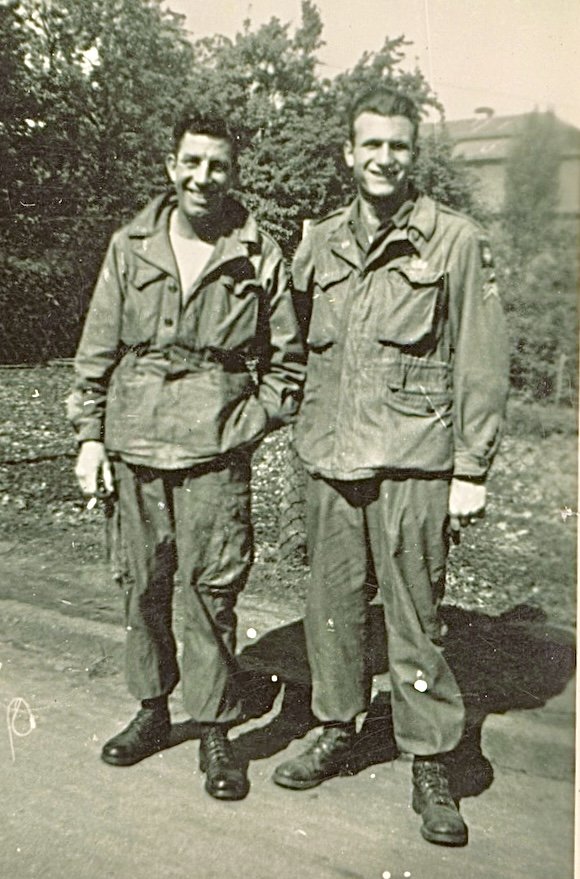James Fitzsimmons
ASN:6897852
PFC James Fitzsimmons
James Joseph Fitzsimmons registered for the draft in his hometown of Philadelphia, Pennsylvania. This thirty-one-year-old was 5-8, 140 pounds with a ruddy complexion, blue eyes, and brown hair. He was unemployed at the time of his registration. His identifying physical characteristics were an appendectomy scar and another scar on the shin of his right leg.
Enlisting in the Army on April 8, 1937, he was discharged in 1940. Fitzsimmons reenlisted and received his airborne training at Fort Bragg, North Carolina. He was later assigned to A-Battery, 319th Field Artillery Group, 82nd Airborne Division.
Along with fellow glidermen, Private Fitzsimmons traveled to North Africa in May 1943. Later promoted in rank to PFC, he fought in six (6) battles and campaigns; Sicily, Naples-Foggia, Normandy, Holland, Ardennes, and Central Europe.
SGT Ted Covais (L) and PVT James Fitzsimmons in Nijmegen, Holland November 8, 1944
Fitzsimmons was an MOS 345 (truck driver). During the Naples-Foggia campaign, fellow A-Battery soldier SGT Ted Covais recalled he and Fitzsimmons re-supplying the Battery after expending hundreds of rounds of ammunition. The supply run down the mountain and into the village of Maiori, Italy, was not without danger. There was only one way back to where the ships were unloading supplies. The route was several miles of narrow winding and minimally paved road, the same one taken after the battalion landed on the beach. Much of it was now congested with men and vehicles from all the units under Colonel Darby’s command.
The road was subject to air attack, snipers, and persistent shelling from German artillery. This was, after all, what was already known as “the Battle of 88 Pass.” During the drive back to the A-Battery gun section the sound of German machine gun fire forced Fitzsimmons to ditch their trailer along the road where he and Covais took cover. Infantry from the Texas 36 Division and a mortar team repelled the enemy attack but took casualties. Fitzsimmons and Covais returned safely to their gun section that day with much needed ammunition.
During “Operation Holland” driving in the forward combat positions was dangerous. Private Fitzsimmons drove a jeep with a .30 caliber machine gun mounted on the back. When they would draw sniper fire SGT Covais recalled, “Fitzsimmons, he'd get on the machine gun and fire back at them. He’d be standing up there, all exposed. You bet I wouldn't do it.”
Photos courtesy of Joseph Covais, author of BATTERY and Charlotte Sartain Provenza
James Fitzsimmons (L-R) Joseph McCormack, George Nedoroscik, Harold Walz - Germany - April 1945
“Company Morning Reports” (see below) were produced every morning by the individual Army units to record personnel matters. The following events were reported for James Fitzsimmons:
On October 19, 1943, Fitzsimmons was reduced in grade from Sergeant to Private.
March 10, 1944, from duty to 5 day furlough at 0600, returning to duty at 2000 hours on March 15, 1944.
July 26, 1944, PFC Fitzsimmons from duty to furlough for 5 days to Manchester, England, returning to duty July 31, 1944, at 2000 hours.
On April 13, 1945, appointed to Private First Class.
Company Morning Reports
Photo Gallery
PFC James Fitzsimmons (above photos) Hurth, Germany - 1945
James Fitzsimmons (L) and Ted Covais, Hurth, Germany - April 1945
The Adjusted Service Rating Score (ASR) was a system the U.S. Army used at the end of the war to determine when soldiers were eligible for discharge. PFC Fitzsimmons was one of many “High Point” soldiers with a score over 85 points and returned to civilian life September 3, 1945.
Following his discharge James Fitzsimmons re-enlisted in the United Air Force achieving the rank of Staff Sergeant. In a veteran’s document dated January 30, 1950, his station was listed as Denver, Colorado.
For his WW II service PFC James Joseph Fitzsimmons was awarded 6 Bronze Battle Stars, Bronze Arrowhead, Good Conduct Medal, the Belgian Fourragere, Presidential Unit Citation Badge, Glider Badge, World War II Victory Ribbon, and the European-African-Middle Eastern Theatre Ribbon.
James Fitzsimmons, 52, died August 20, 1966, in the U.S. Soldiers Home, Washington, D.C.
God Bless this hero.
STL Archive Records























